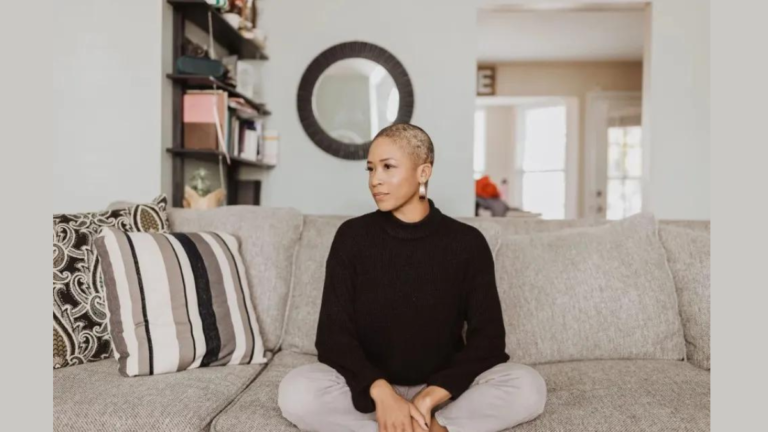
By Word in Black
Alexa Spencer, Word In Black
After nursing all four of her children, Aisha Patterson, 32, of Tulsa, Oklahoma, was shocked to learn in 2020 that she had breast cancer. She’d now joined the 9% of American women diagnosed with the illness before the age of 45. Patterson was also one of the estimated 12 percent of Black women who acquire breast cancer at some time in their lives.
Patterson delayed about six months after finding lumps in her breast to see a doctor. She “genuinely did not believe it could be cancer” at the moment. “I was like, ‘this is an elderly woman’s illness. It could never happen to me,’ she reasoned. The diagnosis did not completely register in her consciousness when her doctor first read the test findings. When her spouse shook her shoulder, she realized what had occurred.
That would not be the last time he and other family members stepped in for Patterson during her chemotherapy and recuperation. The “breast cancer conqueror” spoke with Word In Black about how healthy relationships helped her beat the illness and how other survivors can fight for themselves as well.
WORD IN BLACK: What steps did you take after getting the diagnosis? What were your subsequent steps?
AISHA PATTERSON: I just began contacting my relatives and friends to let them know what was going on.
I begged for some space while I digested it, but you can’t really take much space when you’re identified because things move very fast. Two days later, I met with my breast physician, which was the most difficult appointment I’d ever had. It was worse than finding out I had cancer. I conferred with them, as well as my oncologist, and we pretty much agreed on what therapy would involve.
WIB: How did your family help you during your therapy and recovery?
AP: I was incredibly lucky. My folks encircled me in their affection. They were by my side from the time I was diagnosed. They looked after me and my brothers as well. I did face some difficulties with family members. And I believe a lot of the trauma that we were already dealing with in life started to appear, and they couldn’t be there for me in the ways that I needed — and that was fine. I had to make difficult choices and separate myself.
WIB: What steps did you take to fight for your own needs?
AP: I made a paper called Aisha’s Code of Cancer very early in the process, and it was a list of over 20 different things that addressed my limits, my requirements, and the things I didn’t want them to do or say. It said stuff like, “Please don’t phone me. Writing is more convenient.” Or telling my mother, “I’m going to swear now. That’s all there is to it.” “If you want to do my chores, just do it,” for example. Don’t bother asking because I’ll attempt to persuade you out of it.”
So little things like that helped me cope with them better. And I gave them all that document on Thanksgiving around a fire and I read it to them and said, “you know, I need you people and here’s how you can assist me the best. And I’m hoping that by the conclusion of this, we’ll be stronger.” And I honestly believe it helped and served its goal.
WIB: What advise would you offer to someone dealing with breast cancer and attempting to advocate for themselves?
AP: Individuals behave very differently when they are afflicted with cancer, so you have to meet people where they are but not really meet them. It’s like, comprehend and accept where they are and then say, “OK, well, I still have to look at myself. So you do you over here, and maybe we’ll get back to that later,” because now is the moment to concentrate on yourself.
WIB: What advice would you give to family members who are helping a loved one who is dealing with a diagnosis?
AP: Ask them what they require and then provide it. However, question them only once. Continue to inquire because requirements change at every stage of the path. My requirements, from chemo to surgery to radiation, were vastly different. Finally, when they’re finished with treatment, keep asking that question because, for most cancer patients, the difficult portion begins when they conclude treatment.
WIB: What was your life like after treatment?
AP: It’s like a strange experience going through therapy, at least for me. It was a bizarre sensation of adrenaline and emergency mode. Like, full-on survival mode. It was extremely difficult on an emotional level. But when therapy concluded, all the dust settled…all the feelings settled. So I had more time to think, “Oh my goodness, I went through that.” I developed severe anxiety and panic episodes, as well as PTSD (post-traumatic stress disorder). Going back to the oncology clinic was extremely difficult. So it’s almost as if you don’t have time to really process what’s going on until it’s all over.
WIB: I gather you were not provided with any mental health tools after you completed treatment. What, in your opinion, should have happened?
AP: They would have set me down and told me what I might face, because it was all a shock to me. “Oh my goodness, here I am done,” I thought. “I should be overjoyed.” When, in fact, I was at my lowest point in my existence. As a result, they could have established higher standards. They could have provided me with excellent tools, such as cancer support organisations. And tell me about the choices that were accessible, such as counselling, medicine, one-on-one meetings with other patients, and speaking with a cancer expert.